This is a list of the most notable films produced in the Cinema of Germany in 1939.
This is a list of the most notable films produced in the Cinema of Germany in 1939.
| Title | Director | Cast | Genre | Notes |
|---|---|---|---|---|
| Elbefahrt | Rudolf Gutscher | short | ||
| Tanz der Farben | Hans Fischerkoesen | animation | ||
| Ein Lied verklingt | In Agfacolor | |||
| Wagen Nr. 1 kämpft sich seinen Weg | Gert Fröbe | |||

Klaus Kinski was a German actor. Equally renowned for his intense performance style and notorious for his volatile personality, he appeared in over 130 film roles in a career that spanned 40 years, from 1948 to 1988. He is best known for starring in five films directed by Werner Herzog from 1972 to 1987, who would later chronicle their tumultuous relationship in the documentary My Best Fiend.

Nazism made extensive use of the cinema throughout its history. Though it was a relatively new technology, the Nazi Party established a film department soon after it rose to power in Germany. Both Adolf Hitler and his propaganda minister, Joseph Goebbels, used the many Nazi films to promote the party ideology and show their influence in the burgeoning art form, which was an object of personal fascination for Hitler. The Nazis valued film as a propaganda instrument of enormous power, courting the masses by means of slogans that were aimed directly at the instincts and emotions of the people. The Department of Film also used the economic power of German moviegoers to influence the international film market. This resulted in almost all Hollywood producers censoring films critical of Nazism during the 1930s, as well as showing news shorts produced by the Nazis in American theaters.

Valley of Death in Fordon, Bydgoszcz, northern Poland, is a site of Nazi German mass murder committed at the beginning of World War II and a mass grave of 1,200–1,400 Poles and Jews murdered in October and November 1939 by the local German Selbstschutz and the Gestapo. The murders were a part of Intelligenzaktion in Pomerania, a Nazi action aimed at the elimination of the Polish intelligentsia in Reichsgau Danzig-West Prussia, which included the former Pomeranian Voivodeship. It was part of a larger genocidal action that took place in all German occupied Poland, code-named Operation Tannenberg.

Artists in the Big Top: Perplexed is a 1968 West German film written and directed by Alexander Kluge. The film is made in a collage style, featuring newsreels and quotations from philosophers alongside the story of a failing circus whose owner, Leni, must decide whether her dream of a new kind of circus is too optimistic. The film is a symbolic representation of Kluge's own frustrations in trying to help stimulate the New German Cinema movement.
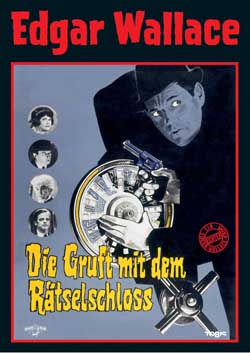
The Curse of the Hidden Vault is a 1964 black and white West German crime film directed by Franz Josef Gottlieb and starring Harald Leipnitz, Eddi Arent, Siegfried Schürenberg and Klaus Kinski. It is based on the 1908 novel Angel Esquire by Edgar Wallace, previously made into a British silent film.

Frisians in Peril is a 1935 German drama film directed by Peter Hagen and starring Friedrich Kayßler, Jessie Vihrog and Valéry Inkijinoff. Made for Nazi propaganda purposes, it concerns a village of ethnic Frisians in Russia.

The Curtain Falls is a 1939 German crime film directed by Georg Jacoby and starring Anneliese Uhlig, Elfie Mayerhofer and Hilde Sessak. It was based on a play by Paul van der Hurck and was made by UFA at the company's Babelsberg Studios in Berlin. The film's sets were designed by the art director Erich Kettelhut.
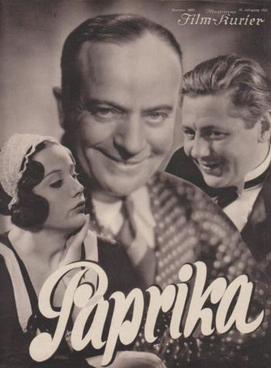
Paprika is a 1932 German comedy film directed by Carl Boese and starring Franciska Gaal, Paul Hörbiger and Paul Heidemann. Made by the German branch of Universal Pictures, it was based on a hit play by Max Reimann and Otto Schwartz. A French-language version and an Italian-language version were released the following year. It is also known by the alternative title of Marriage in Haste. In the US, the film was released almost 2 years later in German on 18 May 1934 in the Yorkville theater under the title Wie man Maenner fesselt (How to charm men).
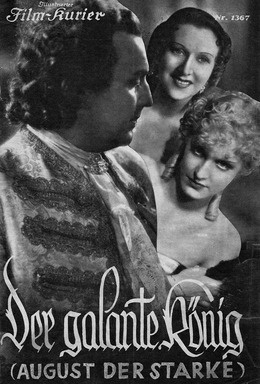
Augustus the Strong is a 1936 German-Polish biographical film directed by Paul Wegener and starring Michael Bohnen, Lil Dagover, and Marieluise Claudius. The film depicts the life of Augustus the Strong, the Eighteenth Century ruler of Saxony and Poland. It was partly shot at the Grunewald Studios in Berlin. The film's sets were designed by the art directors Karl Machus and Ludwig Reiber.

The Ufa-Palast am Zoo, located near Berlin Zoological Garden in the New West area of Charlottenburg, was a major Berlin cinema owned by Universum Film AG, or Ufa. Opened in 1919 and enlarged in 1925, it was the largest cinema in Germany until 1929 and was one of the main locations of film premières in the country. The building was destroyed in November 1943 during the Bombing of Berlin in World War II and replaced in 1957 by the Zoo Palast.
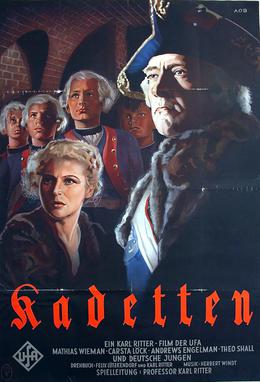
Cadets is a 1939 German historical war film directed by Karl Ritter starring Mathias Wieman, Carsta Löck, and Andrews Engelmann. The film is set in 1760, against the backdrop of the Austro-Russian Raid on Berlin during the Seven Years' War. It depicts a group of Prussian cadets holding off superior Russian forces.

Adventure in Warsaw is a 1938 German-Polish comedy film directed by Carl Boese and starring Georg Alexander, Paul Klinger and Jadwiga Kenda. The film was the second of two German-Polish co-productions following Augustus the Strong (1936).

A Diplomatic Wife is a 1937 German-Polish comedy film directed by Carl Boese and Mieczysław Krawicz and starring Jadwiga Kenda, Aleksander Żabczyński and Lena Żelichowska. It is the Polish language version of Adventure in Warsaw.
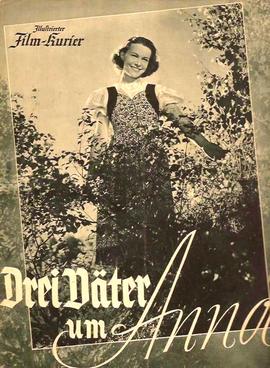
Three Fathers for Anna is a 1939 German comedy film directed by Carl Boese and starring Ilse Werner, Hans Stüwe and Theodor Danegger. It was made by the German company UFA at the firm's Babelsberg Studios in Potsdam, with some location shooting taking place around Passau in Bavaria. The film's sets were designed by the art director Herbert Frohberg.

Woman Without a Past is a 1939 German drama film directed by Nunzio Malasomma and starring Sybille Schmitz, Albrecht Schoenhals, and Maria von Tasnady. It was shot at the Grunewald and Johannisthal Studios in Berlin. The film's sets were designed by the art director Hans Ledersteger.
Klaus Detlef Sierck was a German child actor. He was the son of the theatre and film director Hans Detlef Sierck and the theatre actress Lydia Brincken. After his parents separated in 1928, Sierck grew up with his mother and was distanced from his father during the Nazi period after the latter married actress Hilde Jary, who was Jewish.

Police Report is a 1939 German crime thriller film directed by Rudolf van der Noss and starring Lola Müthel, Hans Zesch-Ballot and Erich Fiedler. It was shot at the Babelsberg Studios in Berlin. The film's sets were designed by the art directors Heinrich Beisenherz and Alfred Bütow. It was produced and distributed by Terra Film.

Mistake of the Heart is a 1939 German romantic drama film directed by Bernd Hofmann and Alfred Stöger and starring Paul Hartmann, Leny Marenbach and Hans Söhnker. It was shot at the Bavaria Studios in Munich. The film's sets were designed by the art directors Robert A. Dietrich and Artur Günther. It was produced and distributed by Bavaria Film, premiering at the Gloria-Palast in Berlin.

Detours to Happiness is a 1939 German drama film directed by Fritz Peter Buch and starring Ewald Balser, Lil Dagover and Viktor Staal. It was shot at the Tempelhof Studios in Berlin and on location in Kitzbühel in the Tyrol in annexed Austria. The film's sets were designed by the art directors Wilhelm Depenau and Ludwig Reiber. It was distributed by UFA, Germany's largest film company of the era.